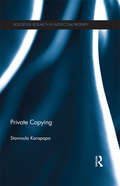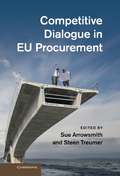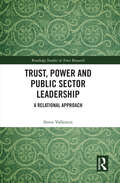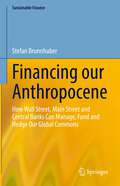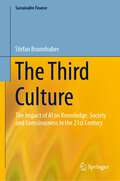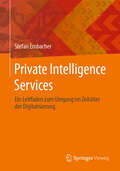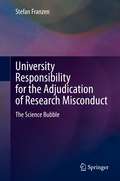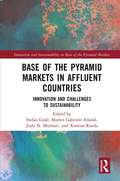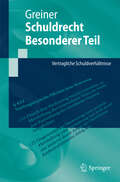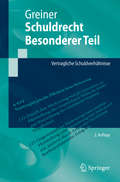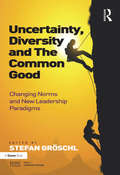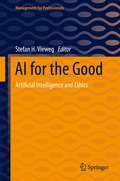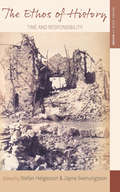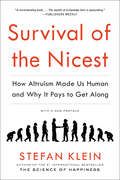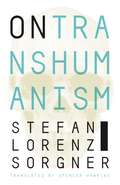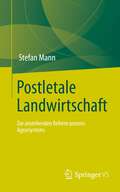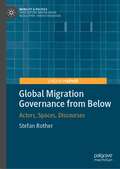- Table View
- List View
Official Hawaii Driver's Manual
by State of Hawaii Department of TransportationThis manual is designed for use as a guide to help you become a safer driver and to help you qualify for a Hawaii driver’s license. The information contained herein does not supersede either state laws or county ordinances or any duly adopted rule or regulation.
The 2024 New Jersey Driver Manual English
by State of New JerseyThe New Jersey Driver Manual will help you learn and understand safe driving practices. This manual provides valuable information that you will need to pass the knowledge portion of New Jersey’s driver test. The manual will offer important safety information to help you become a safe, courteous, and aware driver. If you already have a New Jersey driver license, this manual can help you refresh your knowledge and provide an update for new laws and rules of the road. Please remember: Driving Is A Privilege, Not A Right. The information contained in this manual should be used as a general guide to the rules of driving a motor vehicle but not as a substitute for the actual laws. If there is a discrepancy between what is cited in this manual and what is in statute or regulation, the statute or regulation governs. This manual is not a legal reference for New Jersey motor vehicle and traffic laws.
Private Copying (Routledge Research in Intellectual Property)
by Stavroula KarapapaThis book offers an original analysis of private copying and determines its actual scope as an area of end-user freedom. The basis of this examination is Article 5(2)(b) of the Copyright Directive. Despite the fact that copying for private and non-commercial use is permitted by virtue of this article and the national laws that implemented it, there is no mandate that this privilege should not be technologically or contractually restricted. Because the legal nature of private copying is not settled, users may consider that they have a ‘right’ to private copying, whereas rightholders are in position to prohibit the exercise of this ‘right’. With digital technology and the internet, this tension has become prominent: the conceptual contours of permissible private copying, namely the private and non-commercial character of the use, do not translate well, and tend to be less clear in the digital context. With the permissible limits of private copying being contested and without clarity as to the legal nature of the private coping limitation, the scope of user freedom is being challenged. Private use, however, has always remained free in copyright law. Not only is it synonymous with user autonomy via the exhaustion doctrine, but it also finds protection under privacy considerations which come into play at the stage of copyright enforcement. The author of this book argues that the rationale for a private copying limitation remains unaltered in the digital world and maintains there is nothing to prevent national judges from interpreting the legal nature of private copying as a ‘sacred’ privilege that can be enforced against possible restrictions. Private Copying will be of particular interest to academics, students and practitioners of intellectual property law.
Competitive Dialogue in Eu Procurement
by Sue Arrowsmith Steen TreumerCompetitive dialogue is a procedure introduced into the EU procurement system in 2004 to provide an improved method for awarding complex contracts, such as those for public infrastructure and major IT systems. This book provides a critical examination of the legal rules on this new procedure, focusing in particular on grey areas such as availability of the procedure and the scope for negotiations after 'final tenders'. It considers both the EU-level rules and the way in which those rules have been applied in national systems. The examination draws on extensive evidence of the way in which the procedure has been operated and interpreted across Europe, including from several studies commissioned specifically for this volume. It also includes an extensive chapter co-authored by the volume editors which provides a thorough analysis of the EU-level rules, a comparative reflection on national experiences and significant critical commentary and recommendations.
Trust, Power and Public Sector Leadership: A Relational Approach (Routledge Studies in Trust Research)
by Steen VallentinTrust, Power and Public Sector Leadership: A Relational Approach provides a critical theoretical treatment of trust in the realm of public management and governance. The public trust agenda is an antidote to rampant bureaucratic control and, in particular, the marketization and instrumentalization associated with New Public Management. The book approaches trust from a relational perspective that draws on insights from trust research, modern sociology and organization and management theory, while lending support to developments in New Public Governance. It provides a theoretical framework that distinguishes between institutional, economic, moral and relational trust and shows how a relational perspective is able to incorporate insights from the other paradigms in an inclusive approach to trust processes. Apart from providing a theoretical reading of the workings of trust in public organizations, the book addresses how trust relates to power and control along with notions of debureaucratization, post-bureaucratic organization and post-heroic leadership. It also shows how the trust agenda, in theory and practice, is related to social capital and thus efforts to strengthen social relations and collaboration in and around public organizations. Speaking of practice, the book takes its empirical point of departure in the Danish public sector. However, the aim of the book is not to promote the "High trust" Danish case as a benchmark or best practice. The aim is to theorize and help make sense of this particular experience by applying general theory to it and extracting general insights – with broader application – from its particular manifestations and outcomes. There is a need for more elaborate theorizing about trust and power in a public sector setting, and the Danish experience is useful as a starting point for this ambition.
Financing our Anthropocene: How Wall Street, Main Street and Central Banks Can Manage, Fund and Hedge Our Global Commons (Sustainable Finance)
by Stefan BrunnhuberDevelopment needs to meet the UN SDG have primarily been financed through private sector financing, conventional public sector funding and philanthropic commitment. These sources are not sufficient in scale and speed to meet the pressing finance needs. The world community is too busy repairing, stabilizing, and refunding the system to maintain the stability of the existing system. The introduction of a parallel electronic currency specifically designed to finance global commons, and a human-centred economy would provide the necessary resources to achieve the UN SDGs while stabilizing the existing monetary system.This book analyses how the development of cryptocurrencies based on blockchain distributed ledger technologies has prompted leading central banks around the world to study the potential application of this approach to directly inject purchasing power without dependence on the banking system. Furthermore, the book illustrates how this approach can be utilized to finance the huge multi-trillion dollar annual investment requirements for achieving the Sustainable Development Goals (SDG).With a Foreword from the President of the Club of Rome.“This book is where fiction turns into fact.” - World Bestselling Author of ‚The Minister of the Future‘ Stan Robinson“…challenging, innovative and interdisciplinary… to address the world’s problems.” - Founder and Father of the Quantitative Easing (QE), Prof. Dr. Richard Werner, Oxford University, GB“The real tragedy of the commons, as this book shows, is that we have allowed the most valuable social resources, our money and legal systems, to be employed for private gain instead of mobilizing them for social goals, not the least to ensure the survival of the human species on this planet.” - Best-selling author of ‚The code of capital’ Katharina Pistor, Edwin B. Parker Professor of Comparative Law and Director, Center on Global Legal Transformation Columbia Law School, USA
The Third Culture: The Impact of AI on Knowledge, Society and Consciousness in the 21st Century (Sustainable Finance)
by Stefan BrunnhuberWe are currently witnessing the emergence of a ‘third culture’, driven by unprecedented developments that are changing the playing field. These include advances in AI, big data analysis and robotics. The traditional ‘two cultures’ view (S. P. Snow) distinguishes between the sciences and the humanities. The wisdoms these two cultures offer are separated from each other, with little to no interaction or mutual comprehension. However, over the past two decades, and for the first time in human history, a new, third culture has appeared. This new culture, rooted in new technologies, not only pursues its own form of rationality but also supports advances in the original two cultures, deepening and expanding our individual and collective consciousness so that we can see more and do better. It will eventually give rise to new forms of consciousness based not on biochemical signals, but on copper wires and lithium chips. These new machine intelligences will change the world and force us to realise: we are no longer alone. The human species’ position in the twenty-first century will be fundamentally redefined: not as a conductor leading the orchestra, but a single string player within it.
Private Intelligence Services: Ein Leitfaden zum Umgang im Zeitalter der Digitalisierung
by Stefan EmbacherDie Einführung des Buches legt den Grundstein für die nachfolgenden Kapitel, indem sie die Definitionen und Grundlagen der Wirtschaftskriminalität klärt und ein solides Verständnis für die Dimensionen und die Tragweite dieser Herausforderung schafft. Sie legt dar, wie Wirtschaftskriminalität nicht nur finanzielle Verluste verursacht, sondern auch das Vertrauen in Märkte und Institutionen untergräbt, was weitreichende soziale und wirtschaftliche Konsequenzen nach sich zieht. Im ersten Kapitel wird die Zusammenarbeit zwischen privaten Intelligence-Unternehmen und staatlichen Behörden beleuchtet. Es werden Fallstudien und Beispiele präsentiert, die demonstrieren, wie eine erfolgreiche Partnerschaft aussehen kann, und welche Herausforderungen und Spannungsfelder dabei auftreten können. Das Kapitel unterstreicht die Bedeutung von Vertrauen, Transparenz und gegenseitigem Respekt für den Erfolg dieser Kooperationen. Das zweite Kapitel widmet sich den spezifischen Herausforderungen und Anforderungen, die verschiedene Branchen und Sektoren an private Intelligence-Unternehmen stellen. Es wird detailliert aufgezeigt, wie unterschiedlich die Bedürfnisse von Unternehmen, je nach Größe, Branche und geografischer Lage sein können, und wie maßgeschneiderte Lösungen aussehen können. Es wird deutlich, dass eine tiefgehende Branchenkenntnis und Spezialisierung essentiell sind, um effektive Dienstleistungen zu bieten. Das dritte Kapitel ist in mehrere Unterkapitel gegliedert und deckt ein breites Spektrum an Themen ab, darunter die besonderen Anforderungen bestimmter Zielgruppen, Methoden und Techniken zur Sicherung von Vermögenswerten und Informationen, sowie praxisnahe Fallbeispiele und Best Practices. Hier wird auch aufgezeigt, wie Unternehmen wie Foreus als Dienstleister in der Praxis agieren und welche Rolle sie im Gesamtkontext spielen. Das vierte Kapitel setzt sich mit den rechtlichen und ethischen Aspekten von Private Intelligence auseinander. Es werden aktuelle Gesetzgebungen und Rechtsprechungen diskutiert, ethische Dilemmata beleuchtet und klare Empfehlungen und Richtlinien für verantwortungsvolles Handeln präsentiert. Das fünfte Kapitel blickt in die Zukunft und versucht eine Prognose über die nächsten 10 Jahre im Bereich Private Intelligence und Wirtschaftskriminalität abzugeben. Es werden technologische Entwicklungen, Ausbildungs- und Weiterbildungsmöglichkeiten sowie potentielle Herausforderungen und Chancen diskutiert. Das abschließende sechste Kapitel fasst die zentralen Erkenntnisse zusammen, bietet konkrete Handlungsempfehlungen für verschiedene Fachleute und endet mit abschließenden Gedanken und einem Ausblick in die Zukunft.
University Responsibility for the Adjudication of Research Misconduct: The Science Bubble
by Stefan FranzenThis book offers a scientific whistleblower’s perspective on current implementation of federal research misconduct regulations. It provides a narrative of general interest that relates current cases of research ethics to philosophical, historical and sociological accounts of fraud in scientific research. The evidence presented suggests that the problems of falsification and fabrication remain as great as ever, but hidden because the current system puts universities in charge of investigations and permits them to use confidentiality regulations to hide the outcomes of investigations. The book documents the significant conflict of interest that arises because federal regulation gives universities the responsibility to conduct investigations of their own faculty with severely limited oversight. The book is intended for young research scientists or anyone who wishes to understand the challenges faced by scientists in the workplace today. The central thread in the book is an exclusive account of an experienced research scientist who was the first to expose the facts that led to the longest running research misconduct investigation in the history of the National Science Foundation.
Base of the Pyramid Markets in Affluent Countries: Innovation and challenges to sustainability (Innovation and Sustainability in Base of the Pyramid Markets)
by Stefan GoldThe Frugal Innovation and Bottom of the Pyramid Markets series comprises four volumes, covering theoretical perspectives, themes and various aspects of interest across four key geographical regions where BOP markets are located - South America, Asia, Africa and more engineered countries. BOP always addresses the poorest people or socioeconomic order or groups within a country, society, region or continent, thus, this series contributes a profound understanding of BOP markets across the most important geographical areas around the world and presents valuable insights on how the private sector can work together with other stakeholders to develop and operationalize economically viable business models in BOP markets, all the while contributing to sustainable development. Private actors such as multinationals, SMEs and entrepreneurs have a critical role to play in achieving the Sustainable Development Goals agenda as laid down by United Nations in September 2015. Yet, BOP markets face unique challenges and the private sector alone cannot orchestrate sustainable value creation activities. Each volume presents several theoretical strands that highlight the diverse approaches and solutions to developing BOP markets further. Frugal, reverse and inclusive innovations can foster (sustainable) development and provide new business models and value streams that other countries can also benefit from. A variety of stylistic elements, such as research work, interviews and roundtable discussions, offer a wide and vivid impression of ongoing challenges and fruitful solutions.
Schuldrecht Besonderer Teil
by Stefan GreinerIn dem Lehrbuch sind die vertraglichen Schuldverhältnisse so aufbereitet, dass Leser Zusammenhänge herstellen und Hintergründe erkennen können. Schwerpunkte sind das Kauf- und Werkvertragsrecht, wobei ein besonderes Augenmerk den Verknüpfungen mit dem allgemeinen Schuldrecht gilt. Klausur- und examensrelevante Probleme werden kompakt dargestellt und durch zahlreiche anschauliche Fallbeispiele und schematische Übersichten ergänzt. Zentrale Aussagen und wichtige Querverweise sind optisch hervorgehoben.
Schuldrecht Besonderer Teil: Vertragliche Schuldverhältnisse (Springer-Lehrbuch)
by Stefan GreinerDas Lehrbuch bietet eine didaktisch aufbereitete Darstellung der vertraglichen Schuldverhältnisse. Schwerpunkte sind das Kauf- und Werkvertragsrecht. Ein besonderes Augenmerk gilt den Verknüpfungen zum allgemeinen Schuldrecht. Die systematische Darstellung wird ergänzt durch Fallbeispiele und schematische Übersichten. Zentrale Aussagen und wichtige Querverweise sind optisch hervorgehoben.
Uncertainty, Diversity and The Common Good: Changing Norms and New Leadership Paradigms
by Stefan GröschlBecause of a management model emphasizing standardization and a one-size-fits-all approach, the previous good health of firms depended on economic performance and maximizing shareholder value. The enduring financial crisis and the ensuing leadership void have forced us all to reconsider the rules of the game and to take into account economic and social factors, in order to address the needs of an unpredictable world. In Uncertainty, Diversity and The Common Good, contributors from leading academic institutions around the World discuss different models of socially responsible global leadership. Their perspectives embrace philosophy; sociology; psychology; ecological and environmental economics; management; and entrepreneurship. Together they explore unpredictability and how being responsible for social as well as economic outcomes requires intelligences that enable managers to adapt and to develop a sustainable, lasting and consistent managerial approach. Working with local communities, integrating minorities, and redistributing wealth, they say, requires a new model of socially responsible leadership that brings together dimensions that are incompatible within existing paradigms. This book indicates what new paradigms might look like, with particular regard to the issue of diversity as an asset with which to confront uncertainty. Case studies tell of leaders working with diversity to create social change and new visions of leadership that are impacting social and cultural norms. This leads to discussion of the nature and diversity of leadership itself which will be helpful to academic researchers and higher level students, as well as policy makers and practitioners.
AI for the Good: Artificial Intelligence and Ethics (Management for Professionals)
by Stefan H. ViewegWhile technology advances at a high pace in the age of machine learning, there is a lack of clear intent and framing of acceptable ethical standards. This book brings together the complex topic of "good" technology in a cross-functional way, alternating between theory and practice.The authors address the ever-expanding discussion on Artificial Intelligence (AI) and ethics by providing an orientation. Pragmatic and recent issues are especially taken into account such as the collateral effects of the COVID19 pandemic. An up-to-date overview of digitization - already a very broad field in itself - is presented along with an analysis of the approaches of AI from an ethical perspective. Furthermore, concrete approaches to consider appropriate ethical principles in AI-based solutions are offered. The book will be appealing to academics, from humanities or business or technical disciplines, as well as practitioners who are looking for an introduction to the topic and an orientation with concrete questions and assistance.
KI für das Gute: Künstliche Intelligenz und Ethik
by Stefan H. ViewegWährend die Technologie im Zeitalter des maschinellen Lernens rasant voranschreitet, mangelt es an klaren Absichten und der Formulierung akzeptabler ethischer Standards. Dieses Buch fasst das komplexe Thema der "guten" Technologie bereichsübergreifend zusammen und wechselt zwischen Theorie und Praxis. Die Autoren gehen auf die sich ständig ausweitende Diskussion über Künstliche Intelligenz (KI) und Ethik ein und geben eine Orientierung. Dabei werden insbesondere pragmatische und aktuelle Fragestellungen berücksichtigt, wie z.B. die Kollateralwirkungen der COVID19-Pandemie. Ein aktueller Überblick über die Digitalisierung - an sich schon ein sehr weites Feld - wird ebenso vorgestellt wie eine Analyse der Ansätze von KI aus ethischer Perspektive. Darüber hinaus werden konkrete Ansätze zur Berücksichtigung angemessener ethischer Prinzipien in KI-basierten Lösungen angeboten. Das Buch richtet sich sowohl an Wissenschaftler aus geistes- und wirtschaftswissenschaftlichen oder technischen Disziplinen als auch an Praktiker, die eine Einführung in das Thema und eine Orientierung mit konkreten Fragen und Hilfestellungen suchen.
The Ethos of History: Time and Responsibility (Making Sense of History #34)
by Stefan Helgesson and Jayne SvenungssonAt a time when rapidly evolving technologies, political turmoil, and the tensions inherent in multiculturalism and globalization are reshaping historical consciousness, what is the proper role for historians and their work? By way of an answer, the contributors to this volume offer up an illuminating collective meditation on the idea of ethos and its relevance for historical practice. These intellectually adventurous essays demonstrate how ethos—a term evoking a society’s “fundamental character” as well as an ethical appeal to knowledge and commitment—can serve as a conceptual lodestar for history today, not only as a narrative, but as a form of consciousness and an ethical-political orientation.
Justifying Genocide: Germany and the Armenians from Bismark to Hitler
by Stefan IhrigAs Stefan Ihrig shows in this first comprehensive study, many Germans sympathized with the Ottomans' longstanding repression of the Armenians and with the Turks' program of extermination during World War I. In the Nazis' version of history, the Armenian Genocide was justifiable because it had made possible the astonishing rise of the New Turkey.
Studies in Legal History: The Old English Penitentials and Anglo-Saxon Law
by Stefan JurasinskiSome of the earliest examples of medieval canon law are penitentials - texts enumerating the sins a confessor might encounter among laypeople or other clergy and suggesting means of reconciliation. Often they gave advice on matters of secular law as well, offering judgments on the proper way to contract a marriage or on the treatment of slaves. This book argues that their importance to more general legal-historical questions, long suspected by historians but rarely explored, is most evident in an important (and often misunderstood) subgroup of the penitentials: composed in Old English. Though based on Latin sources - principally those attributed to Theodore, Archbishop of Canterbury (d. 690) and Halitgar of Cambrai (d. 831) - these texts recast them into new ordinances meant to better suit the needs of English laypeople. The Old English penitentials thus witness to how one early medieval polity established a tradition of written vernacular law.
Survival of the Nicest: How Altruism Made Us Human and Why It Pays to Get Along
by Stefan KleinAward-winning, international bestselling science writer Stefan Klein explores the benefits of altruism on humanity in Survival of the Nicest.The phrase “survival of the fittest” conjures an image of the most cutthroat individuals rising to the top. But Stefan Klein, author of The Science of Happiness, makes the startling assertion that altruism is the key to lasting personal and societal success. In fact, altruism defines us: Natural selection favored those early humans who cooperated in groups, and with survival more assured, our altruistic ancestors were free to devote brainpower to developing intelligence, language, and culture—our very humanity. Klein’s groundbreaking findings lead him to a vexing question: If we’re really hard-wired to act for one another’s benefit, why aren’t we all getting along? He believes we’ve learned to mistrust our instincts because success is so often attributed to selfish ambition, and with an extraordinary array of material—current research on genetics and the brain, economics, social psychology, behavioral and anthropological experiments, history, and modern culture—he makes the case that generosity for its own sake remains the best way to thrive.“Stefan Klein, an enticing storyteller, marshals the evidence for the value of altruism—not only to one’s family but, much more interestingly, to one’s self and one’s tribe. Altruism is truly contagious!” —Roald Hoffman, Nobel Laureate“A scholarly tour de force about why generosity makes good sense, Survival of the Nicest is also compulsively readable. Klein argues convincingly that helping others is one of the best things we can do for ourselves.” —Elizabeth Svoboda, author of What Makes a Hero?: The Surprising Science of Selflessness
On Transhumanism
by Stefan Lorenz SorgnerTranshumanism is widely misunderstood, in part because the media have exaggerated current technologies and branded the movement as dangerous, leading many to believe that hybrid humans may soon walk among us and that immortality, achieved by means of mind-uploading, is imminent. In this essential and clarifying volume, Stefan Lorenz Sorgner debunks widespread myths about transhumanism and tackles the most pressing ethical issues in the debate over technologically assisted human enhancement.On Transhumanism is a vital primer on the subject, written by a world-renowned expert. In this book, Sorgner presents an overview of the movement’s history, capably summarizing the twelve pillars of transhumanist discourse and explaining the great diversity of transhumanist responses to each individual topic. He highlights the urgent ethical challenges related to the latest technological developments, inventions, and innovations and compares the unique cultural standing of transhumanism to other cultural movements, placing it within the broader context of the Enlightenment, modernity, postmodernity, and the philosophical writings of Nietzsche. Engagingly written and translated and featuring an introduction for North American readers, this comprehensive overview of the cultural and philosophical movement of transhumanism will be required reading for students of posthumanist philosophy and for general audiences interested in learning about the transhumanist movement.
On Transhumanism
by Stefan Lorenz SorgnerTranshumanism is widely misunderstood, in part because the media have exaggerated current technologies and branded the movement as dangerous, leading many to believe that hybrid humans may soon walk among us and that immortality, achieved by means of mind-uploading, is imminent. In this essential and clarifying volume, Stefan Lorenz Sorgner debunks widespread myths about transhumanism and tackles the most pressing ethical issues in the debate over technologically assisted human enhancement.On Transhumanism is a vital primer on the subject, written by a world-renowned expert. In this book, Sorgner presents an overview of the movement’s history, capably summarizing the twelve pillars of transhumanist discourse and explaining the great diversity of transhumanist responses to each individual topic. He highlights the urgent ethical challenges related to the latest technological developments, inventions, and innovations and compares the unique cultural standing of transhumanism to other cultural movements, placing it within the broader context of the Enlightenment, modernity, postmodernity, and the philosophical writings of Nietzsche. Engagingly written and translated and featuring an introduction for North American readers, this comprehensive overview of the cultural and philosophical movement of transhumanism will be required reading for students of posthumanist philosophy and for general audiences interested in learning about the transhumanist movement.
Intelligente Vergabestrategien bei Großprojekten: Ein Überblick (essentials)
by Volkmar Agthe Stefan Löchner Steffen SchmittDie Autoren untersuchen die Voraussetzungen f#65533;r eine erfolgreiche Vergabestrategie bei Gro#65533;projekten. Zun#65533;chst analysieren sie die Risiken f#65533;r die am Bau Beteiligten und stellen Varianten dar, wie Planungs- und Bauleistungen zu vergeben sind. Danach werden die M#65533;glichkeiten und Grenzen von in j#65533;ngerer Zeit ,,in Mode gekommenen" Vergabemodellen, insbesondere die Vergabe mit Garantiertem Maximalpreis bzw. die Beauftragung von Construction Managern, diskutiert. Hierauf und auf einer Analyse der typischen Struktur eines (gro#65533;en) Bauprojekts aufbauend, wird ein Vergabemodell entwickelt, das einerseits den Risiken der Baubeteiligten Rechnung tr#65533;gt, andererseits dem Bauherrn die erforderliche Flexibilit#65533;t bel#65533;sst. So kann er in einem kompetitiven Umfeld ein seinen Vorstellungen bez#65533;glich Kosten, Qualit#65533;ten und Terminen entsprechendes Bauvorhaben realisieren.
Postletale Landwirtschaft: Zur anstehenden Reform unseres Agrarsystems
by Stefan MannEs gibt viele Bücher auf dem Markt, die uns erklären, warum wir aufhören sollten, Fleisch zu produzieren und zu essen. Dieses Buch dagegen erklärt, warum wir aufhören werden, Fleisch zu produzieren und zu essen. Und was sich dadurch in der Landwirtschaft verändern wird.Tierrechtler verweisen gerne auf die Abschaffung der Sklavenhaltung und zeigen, worin die vielen Parallelen zur Befreiung landwirtschaftlicher Nutztiere liegen. Leider erklären sie nicht, warum die Sklavenhaltung zwischen 1833 und 1987 in jedem Land der Welt, die Tierproduktion aber in keinem Land der Welt abgeschafft wurde, sondern der globale Fleischkonsum weiter wächst. Es gilt also einerseits zu erklären, warum das Unbehagen immer mehr Konsumenten mit dem, was die einen Wertschöpfungskette, die anderen Tötungsmaschinerie nennen, nicht zu einem Paradigmenwechsel geführt hat. Und warum derzeit die Voraussetzungen dafür geschaffen werden, damit sich dies ändert.So füllt «Postletale Landwirtschaft» die Lücke zwischen tierethischen Abhandlungen und der Fülle «wertfreier» agrar- und umweltwissenschaftlicher Literatur zur Dynamik und den Auswirkungen des Fleischkonsums. Das Buch stellt dar, welche ethischen und welche ökologischen Probleme zwangsläufig zu einer Transformation der Landwirtschaft führen werden. Höchstwahrscheinlich einer Landwirtschaft, zu der das Töten von Tieren nicht mehr gehören wird.
Global Migration Governance from Below: Actors, Spaces, Discourses (Mobility & Politics)
by Stefan RotherAfter a long time of neglect, migration has entered the arena of international politics with a force. The 2018 Global Compact for safe, orderly and regular migration (GCM) is the latest and most comprehensive framework for global migration governance. Despite these dynamics, migration is still predominantly framed as a state-centric policy issue that needs to be managed in a top-down manner. This book proposes a difference approach: A truly multi-stakeholder, multi-level and rights-based governance with meaningful participation of migrant civil society. Drawing on 15 years of participant observation on all levels of migration governance, the book maps out the relevant actors, “invited” and “invented” spaces for participation as well as alternative discourses and framing strategies by migrant civil society. It thus provides a comprehensive and timely overview on global migration governance from below, starting with the first UN High Level Dialogue in 2006, evolving around the Global Forum on Migration and Development (GFMD) and leading up to the consultations for the International Migration Review Forum in 2022.
Baukosten sicher ermitteln – Mit Praxisbeispiel Mehrfamilienhaus: Schnelleinstieg für Architekten und Bauingenieure (essentials)
by Stefan ScholzStefan Scholz stellt in diesem essential die wesentlichen Anforderungen an die Arbeitsweise für eine sichere Kostenplanung dar. Der Leser erhält außerdem Hinweise und Tipps aus der Praxis für die sichere Kostenermittlung von Bauvorhaben. Die Arbeitsdateien und das Praxisprojekt zum Buch ermöglichen eine kurzfristige Umsetzung von Kostenplanungen des eigenen Projektes.


